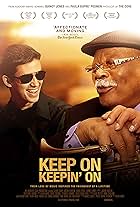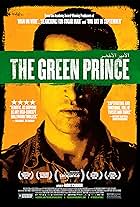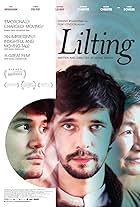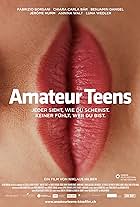Adicionar um enredo no seu idiomaA documentary that tells the story of America's addiction to oil, from its corporate conspiracy beginnings to its current monopoly today, and explains clearly and simply how we can end it - ... Ler tudoA documentary that tells the story of America's addiction to oil, from its corporate conspiracy beginnings to its current monopoly today, and explains clearly and simply how we can end it - and finally win choice at the pump.A documentary that tells the story of America's addiction to oil, from its corporate conspiracy beginnings to its current monopoly today, and explains clearly and simply how we can end it - and finally win choice at the pump.
- Direção
- Roteirista
- Artistas
Greg Anderson
- Self - Author. Designated Drivers
- (as Dr. Greg Anderson)
Daniel Caesar
- Self
- (as Daniel Ceasar)
Luiz Inácio Lula da Silva
- Self
- (as Luiz 'Lula' da Silva)
Avaliações em destaque
This movie is very slick, in both the good and bad meanings of that word. It does not bother with qualifying statements at all. In discussing Ethanol from sugarcane in Brazil, they do not discuss the environmental impact from clear cutting and burning. There is no real discussion of the break even point or capitalization required for methanol and ethanol production.
Several other issues:
* Flex Fuel may require fitting changes as well as a new ECU.
* Modern Flex Fuel automotive equipment was developed by a consortium.
* Trots out the GM trolley car conspiracy without any evidence.
* Claims that Prohibition targeted Ethanol fuel without any evidence.
I wish I could trust this documentary at all.
Several other issues:
* Flex Fuel may require fitting changes as well as a new ECU.
* Modern Flex Fuel automotive equipment was developed by a consortium.
* Trots out the GM trolley car conspiracy without any evidence.
* Claims that Prohibition targeted Ethanol fuel without any evidence.
I wish I could trust this documentary at all.
10tamar-23
As an average movie-goer, PUMP grabbed me the instant I sat down and held me still after I left the theater. Though slightly long for a documentary, every minute is relevant and inspiring. This movie is not about political parties or global warming, it is about YOU and ME - the people that make up this beautiful country. The dent that oil prices are leaving in my wallet are devastating and I'm thrilled to see that something is being done about it and that near and long-term alternatives to oil are out there. Please go see this illuminating film - rate it, spread the word, and find out how you can put some cash back in your wallet.
Riveting! This film examines the story of oil addiction in America. The question is, do we have a choice of fuel?
The purpose of this film is to spread the word that oil is not the only source of fuel for the U.S. I'm guessing parents out there love their cars and know that gas prices are the highest they've been in years. In order to take your child to school, you need to pay and pump expensive gasoline. Or, do you? This film shows that we can have a choice about fuel. Fuel is available that is safer, better for the air and cheaper. Pump proves these ideas with intriguing facts and mind-boggling statistics.
This movie's focus is not about which fuel is better. This documentary provides information about alternative fuels such as ethanol, methanol, natural gas and even electric. Each one has its pros and cons, but just being able to have the ability to choose is what moves this production along.
We hear extremely intellectual interviews with people who are strong about the subject. My only criticism is that the audience for this film is not young kids. Teens who are driving or those starting driver's education will find this important enough to watch. While I found the subject interesting, I do not think kids from 7 to 13 care about the big oil epidemic.
My favorite part is when we see the comparison of air pollution with regular gasoline and methanol, also known as "Wood Alcohol." Dr. Robert Zubrin conducts an experiment where he ignites both fuels. We see that methanol is clean and leaves no residue while gasoline is the opposite. It made me realize what we put in the air every time we run a gasoline engine.
My favorite person interviewed is Luiz Inacio Da Sliva, 35th president of Brazil. The movie states, "under Da Sliva's leadership, Brazil's economy grew by the trillions." He did something that no other country has ever done, achieve complete independence from foreign oil. He gave Brazil the choice of gasoline and ethanol. Da Sliva is what you might call a dreamer. He states, "I believe we will conquer this. I believe the world will learn to live without oil."
This film wants to expose U.S. citizens to the idea of having a choice. We know that there are other forms of fuel and you might think we would use them. This idea was introduced in 2006 with the "Open Fuel Standard Act." Sadly, it never left a committee for a vote. The reason being, that members of the Congress receive 32 million dollars in campaign contribution from big oil.
I give this film 5 out of 5 stars and recommend it to 14 to 18-year- olds. This film shows a great message and an even more amazing vision.
Reviewed by Keefer B.
The purpose of this film is to spread the word that oil is not the only source of fuel for the U.S. I'm guessing parents out there love their cars and know that gas prices are the highest they've been in years. In order to take your child to school, you need to pay and pump expensive gasoline. Or, do you? This film shows that we can have a choice about fuel. Fuel is available that is safer, better for the air and cheaper. Pump proves these ideas with intriguing facts and mind-boggling statistics.
This movie's focus is not about which fuel is better. This documentary provides information about alternative fuels such as ethanol, methanol, natural gas and even electric. Each one has its pros and cons, but just being able to have the ability to choose is what moves this production along.
We hear extremely intellectual interviews with people who are strong about the subject. My only criticism is that the audience for this film is not young kids. Teens who are driving or those starting driver's education will find this important enough to watch. While I found the subject interesting, I do not think kids from 7 to 13 care about the big oil epidemic.
My favorite part is when we see the comparison of air pollution with regular gasoline and methanol, also known as "Wood Alcohol." Dr. Robert Zubrin conducts an experiment where he ignites both fuels. We see that methanol is clean and leaves no residue while gasoline is the opposite. It made me realize what we put in the air every time we run a gasoline engine.
My favorite person interviewed is Luiz Inacio Da Sliva, 35th president of Brazil. The movie states, "under Da Sliva's leadership, Brazil's economy grew by the trillions." He did something that no other country has ever done, achieve complete independence from foreign oil. He gave Brazil the choice of gasoline and ethanol. Da Sliva is what you might call a dreamer. He states, "I believe we will conquer this. I believe the world will learn to live without oil."
This film wants to expose U.S. citizens to the idea of having a choice. We know that there are other forms of fuel and you might think we would use them. This idea was introduced in 2006 with the "Open Fuel Standard Act." Sadly, it never left a committee for a vote. The reason being, that members of the Congress receive 32 million dollars in campaign contribution from big oil.
I give this film 5 out of 5 stars and recommend it to 14 to 18-year- olds. This film shows a great message and an even more amazing vision.
Reviewed by Keefer B.
The general idea of the movie makes a lot of sense, but I am a Brazilian and what they say about Brazil is so terribly wrong and unreal... Sounds like the former president Lula paid for the movie. Just minutes with false propaganda. I can't tell about all the rest, which as I said makes sense, however, the part that I know about makes me think the whole thing wasn't properly investigated at all. Brazil is in a terrible economic crisis... We could say that the movie is from 2012/2013, when things were a bit better, but even though, the ethanol is far far far away from being a competitor beside gas. It was never Lula's, like the movie makes people think. They say 40% of our population entered in the middle class, but what happened is that the government intentionally changed the measuring, so after Lula, anyone who makes 2,500 USD a year (!) can be considered in middle class. It's just ridiculous... and the producers didn't investigate it. They certainly only heard one side of the story... which is the worst thing a documentarist can do.
This is another one of the extremely popular American documentaries in the series: "The government and big companies are Illuminati. The are fighting the public and destroying the world. USA is not free. Take a stand and spread this message and this very specific solution to a very complicated problem!". This is therefore not a "true" documentary about a subject but a subjective message. The good thing is that these documentaries are very entertaining, fast-paced and often very informative and colorful. The bad thing is the fact that they always present a god guy/bad guy story with a clear choice at the end. There are very few untruth in this documentary but many things are left unsaid or unexplored and not a single bad thing is said about ethanol, not a single.
Ethanol is not being used because it is very expensive to make in colder climates like the USA. Majs is not a good crop for that at all and majs is not a good crop for anything. Yes, cows eat it, but we have to change cows so that they will not die from it. And we make suger out of it - not something great. Furthermore majs is grown by the government otherwise it would not be profitable. 0 of these facts were told. I wonder why? It's still very polluting and if USA wants to run on ethanol alone they would probably need the territory at least 3 times the size of the country to grow it on. It is a very ineffective energy source. Without a HUGE subsidy it will never compete with oil, coal or nuclear power. And the documentary puts nuclear power in the same category as oil, gas and coal. They forgot to mention that it is CO2 free, cheap and the safest energy source in the world. Ups... watch Pandoras Promise and other energy documentaries to get a fuller picture. And read the excellent God Species.
Ethanol is not being used because it is very expensive to make in colder climates like the USA. Majs is not a good crop for that at all and majs is not a good crop for anything. Yes, cows eat it, but we have to change cows so that they will not die from it. And we make suger out of it - not something great. Furthermore majs is grown by the government otherwise it would not be profitable. 0 of these facts were told. I wonder why? It's still very polluting and if USA wants to run on ethanol alone they would probably need the territory at least 3 times the size of the country to grow it on. It is a very ineffective energy source. Without a HUGE subsidy it will never compete with oil, coal or nuclear power. And the documentary puts nuclear power in the same category as oil, gas and coal. They forgot to mention that it is CO2 free, cheap and the safest energy source in the world. Ups... watch Pandoras Promise and other energy documentaries to get a fuller picture. And read the excellent God Species.
Você sabia?
- CuriosidadesWon the 2015 "Falsie" award for hidden agendas in documentaries
Principais escolhas
Faça login para avaliar e ver a lista de recomendações personalizadas
Detalhes
- Data de lançamento
- Países de origem
- Central de atendimento oficial
- Idioma
- Também conhecido como
- Pump
- Empresas de produção
- Consulte mais créditos da empresa na IMDbPro
Bilheteria
- Orçamento
- US$ 2.000.000 (estimativa)
- Faturamento bruto nos EUA e Canadá
- US$ 89.787
- Fim de semana de estreia nos EUA e Canadá
- US$ 42.200
- 21 de set. de 2014
- Faturamento bruto mundial
- US$ 89.787
- Tempo de duração
- 1 h 28 min(88 min)
- Cor
Contribua para esta página
Sugerir uma alteração ou adicionar conteúdo ausente
























